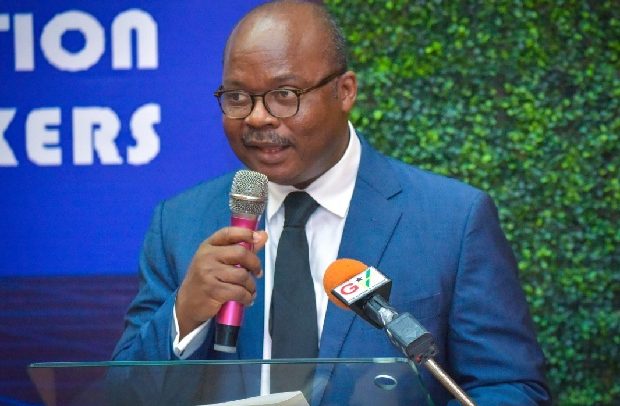Dr. Ernest Addison – Governor of BoG
The Bank of Ghana (BoG) has inaugurated the payment systems advisory committee.
Members of the Committee include the Governor/his alternative, Sampson Akligoh Ministry of Finance; Archie Hesse, Ghana Interbank and Settlement Systems (GhIPSS); Evelyn Essien; Securities and Exchange Commission (SEC); Ing. Kenneth Ashigbey, Ghana Chamber of Telecommunications;
Samuel Sarpong, Ghana Association of Bankers; Kwaku Kyei Ofori, National Information Technology Agency (NITA), and Charles Atuahene, Association of Ghana Industries (AGI).
The Payment Systems Advisory Committee under the Chairmanship of the Governor, as stated under Section 4(2) of Act 987, is required to advise the Bank on regulation and oversight of the payment systems, operational and technical stands of the payment systems, and any other matters affecting payment services clearing and settlement of payments.
In a speech at the inauguration ceremony, the Governor of BoG, Dr Ernest Addison, said the inauguration of the Committee marks another landmark in Ghana’s journey to develop a safe, efficient, competitive, and inclusive payment system for Ghana.
“As we all know, payment systems are essential components of a modern economy. It is imperative therefore, that stakeholders must plan, design, and implement payment systems reforms in a holistic manner,” he said.
He noted that over the past two decades, the Ghana’s payment system infrastructure has recorded rapid transformation supported by digitisation.
To recap, the evolution of the payment system started with the establishment of the Real Time Gross Settlement System, the Automated Clearing House, Cheque Codeline Clearing and Truncation System, the National Switch (E-zwich) and Smartcard Projects, according to him.
All these culminated in the establishment of the Ghana Interbank Payment and Settlement Systems (GhIPSS) with a mandate to oversee all interbank payment and processing activities, he said.
The implementation of the mobile money interoperability system, he observed, was another significant achievement within Ghana’s payment ecosystem.
The interoperability system has enabled seamless funds transfer across platforms of electronic money issuers on one hand, and between mobile money ecosystem and bank accounts on the other, the Governor explained.
“This interconnectedness has laid the foundation for the efficient delivery of digital financial services and the scaling up of financial inclusion,” he said.
The increasing digitisation of the payment systems landscape, he said, has also widened the scope for financial technology firms (Fintechs) to operate.
“Among others, Fintechs have continued to create innovative products and services that meet the needs of various customer types at affordable costs, which is critical for financial access. Importantly, the Government’s quest to formalise the economy through digitisation places the payment system at the core of the national development agenda.”
“Indeed, the payment system has become the central focus for delivering several digital products including pension, insurance, credit, investments, and savings.
- Without doubt, the payment system is of systemic importance and engenders financial inclusion.”
He added that “Therefore, the Bank of Ghana will continue to strengthen the supportive structures, including the provision of strong regulatory and prudential oversight to ensure that the payment system is safe, efficient, competitive, and supportive of innovation.”
He further explained that it is against this background that the Bank facilitated the enactment of the Payment Systems and Services Act, 2019 (Act 987).
“Among others, Act 987 seeks to provide a strong regulatory framework for the emerging digital payment environment.”
“This includes establishing the critical supportive governance structures to promote orderly development of a safe and efficient payment ecosystem.”
“Broadly, this underscores the reason for today’s launch of the Payment Systems Advisory Committee,” he said.
BY Melvin Tarlue


